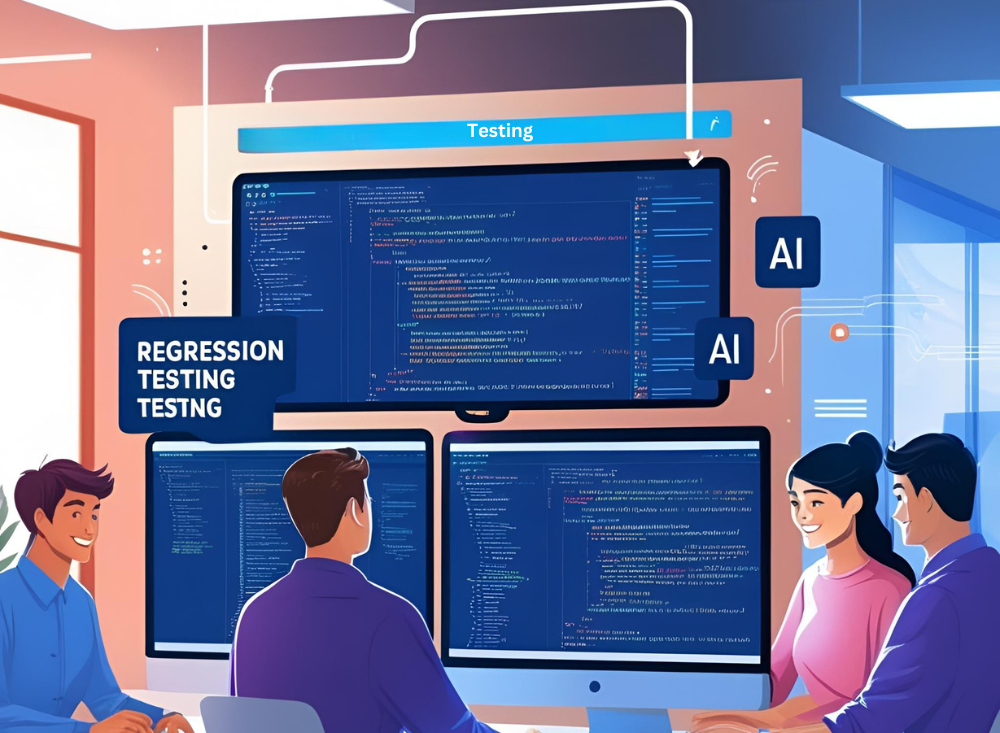
Regression testing is a critical part of the software development lifecycle (SDLC) that ensures new changes or updates do not break existing functionality. However, as applications grow in complexity, regression testing can become time-consuming, resource-intensive, and prone to human error. This is where Artificial Intelligence (AI) comes into play. By leveraging AI in regression testing, organizations can enhance efficiency, accuracy, and overall software quality. This article explores how AI is transforming regression testing and the benefits it brings to the table.
What is Regression Testing?
Regression testing is a type of software testing that verifies whether new code changes have adversely affected the existing functionality of an application. It involves re-running previously executed test cases to ensure that the software continues to work as expected after modifications.
Challenges in Traditional Regression Testing
Traditional regression testing faces several challenges:
- Time-Consuming: Executing a large number of test cases manually or even with automation can be slow.
- Resource-Intensive: Maintaining and updating test scripts requires significant effort and expertise.
- Human Error: Manual testing is prone to mistakes, especially in repetitive tasks.
- Limited Coverage: It’s difficult to achieve comprehensive test coverage due to time and resource constraints.
- Dynamic Applications: Modern applications with frequent updates and complex integrations make regression testing even more challenging.
How AI Enhances Regression Testing
AI brings a new level of intelligence and automation to regression testing, addressing many of the challenges associated with traditional methods. Here’s how AI is revolutionizing regression testing:
1.Intelligent Test Case Selection
- AI algorithms can analyze code changes and identify which test cases are most relevant to the modifications. This reduces the number of tests that need to be executed, saving time and resources.
- Example: If a change is made to the login module, AI can prioritize test cases related to authentication and security.
2.Self-Healing Test Scripts
- AI can automatically update test scripts when there are changes in the application’s UI or functionality. This eliminates the need for manual script maintenance and reduces downtime.
- Example: If a button’s ID changes, AI can detect the change and update the test script accordingly.
3.Predictive Analysis
- AI can predict potential areas of risk based on historical data, code changes, and testing outcomes. This allows testers to focus on high-risk areas and improve test coverage.
- Example: AI can identify modules that are most likely to fail based on past defects and testing trends.
4.Automated Test Data Generation
- AI can generate realistic and diverse test data to ensure comprehensive coverage. This is particularly useful for testing edge cases and boundary conditions.
- Example: AI can create test data for different user roles, input values, and scenarios.
5.Enhanced Defect Detection
- AI-powered tools can analyze test results and identify patterns that indicate potential defects. This helps in early detection and resolution of issues.
- Example: AI can flag anomalies in response times or error rates that may indicate performance issues.
6.Continuous Testing
- AI enables continuous regression testing by integrating with CI/CD pipelines. Tests can be executed automatically whenever there is a code change, ensuring faster feedback and quicker releases.
- Example: AI can trigger regression tests after every code commit and provide instant feedback to developers.
7.Visual Validation
- AI can perform visual regression testing by comparing screenshots of the application before and after changes. This helps detect UI inconsistencies and visual bugs.
- Example: AI can identify differences in layout, color, or font that may have been introduced by a recent update.
Benefits of Using AI in Regression Testing
Integrating AI into regression testing offers several advantages:
- Improved Efficiency: AI reduces the time and effort required for test case selection, execution, and maintenance.
- Higher Accuracy: AI minimizes human error and ensures more reliable test results.
- Better Coverage: AI enables comprehensive testing by identifying high-risk areas and generating diverse test data.
- Faster Feedback: Continuous testing with AI provides instant feedback, accelerating the development process.
- Cost Savings: By automating repetitive tasks and reducing manual effort, AI lowers the overall cost of regression testing.
- Scalability: AI can handle large and complex applications, making it suitable for modern software development.
Real-World Applications of AI in Regression Testing
AI-powered regression testing is being used across various industries to improve software quality:
- E-commerce: Ensuring that new features or updates do not break the checkout process or product listings.
- Banking and Finance: Validating the stability and security of online transactions and account management systems.
- Healthcare: Testing patient management systems and telemedicine platforms to ensure reliability and compliance.
- Gaming: Verifying that game updates do not introduce bugs or performance issues.
- Enterprise Software: Ensuring seamless functionality across complex, integrated systems.
Challenges of Using AI in Regression Testing
While AI offers many benefits, it also comes with challenges:
- Initial Setup: Implementing AI-powered regression testing requires significant upfront investment in tools, training, and infrastructure.
- Data Dependency: AI algorithms rely on high-quality data for accurate predictions and analysis.
- Complexity: AI-powered testing tools may require specialized skills and expertise to configure and maintain.
- Ethical Considerations: Ensuring transparency and fairness in AI algorithms is crucial to avoid biased outcomes.
Conclusion
AI is transforming regression testing by making it faster, smarter, and more efficient. By leveraging AI for intelligent test case selection, self-healing scripts, predictive analysis, and continuous testing, organizations can significantly boost software quality and accelerate their development cycles.
While challenges like initial setup costs and data dependency exist, the long-term benefits of AI-powered regression testing far outweigh the drawbacks. Start exploring AI-driven solutions today and take your regression testing efforts to the next level. With AI, you can ensure that your software remains robust, reliable, and ready for the future!